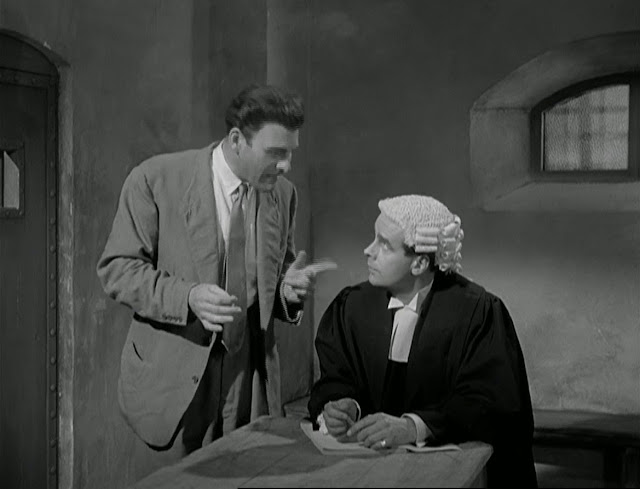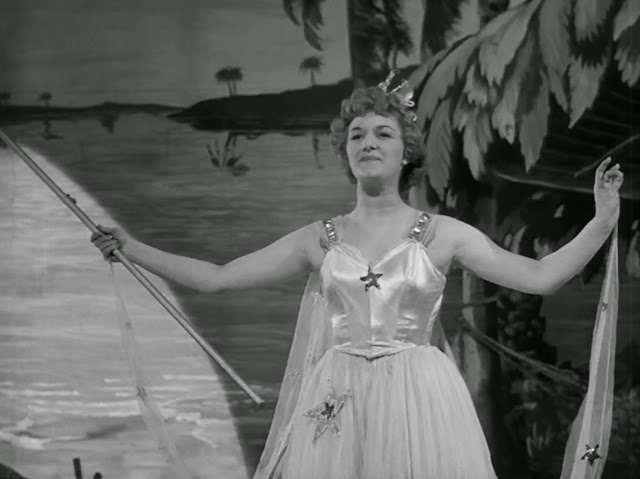Brothers in Law (1957)
 |
| Ian Carmichael |
If there's a British comedy of the 1950s that you haven't seen, but really should see, then it is Brothers in Law. This 1957 Boulting Brothers film is a much underrated, and under-seen, film that follows the courtroom adventures of Roger Thursby (Ian Carmichael), a newly qualified barrister, as he struggles to build a career. Based on the novels of barrister Henry Cecil (you should try to find them, they are really quite entertaining), the film reveals the struggles of the naïve barrister as he tries to deal with judges who are ignorant of the law, witnesses who are afraid to tell the truth, plaintiffs with little grasp on the truth and the general speed with which the majority of court cases are conducted - leaving the less experienced barrister with little room to make even the slightest error.
 |
| Ian Carmichael |
What is so surprising is that Brothers in Law is not as well known as some of Ian Carmichael's other films. Lucky Jim, Private's Progress, School for Scoundrels and I'm Alright Jack all come from the same period and feature Ian Carmichael as the hapless innocent, a nice (but not dim) guy who is thrown into a world where he is surrounded, and exploited, by those more worldly wise. Yet Brothers in Law stands alone with perhaps more charm than some of those other films.
The real stand-out performance is from Terry-Thomas playing a low level con man who chooses Roger to defend him. Terry-Thomas appears with Carmichael in all the films listed above, yet is only here that he strays out of character. Instead of playing the smooth, charming, but corrupt, womaniser - your archetypal cad - he plays a wide-boy, an unashamed criminal. There's no trace of the refined accent that Terry-Thomas had worked so hard on to conceal his real voice. Instead we perhaps get an indication of his original voice.
 |
| Terry-Thomas |
 |
| Terry-Thomas and Ian Carmichael |
And, unlike those previous films, Terry-Thomas doesn't pit himself against Carmichael. Instead he helps him to win his first case, although he does have to lead the confused barrister through every step of the proceedings. It's a revelation to see Terry-Thomas in a crumpled suit and shiny tie rather than his more usual finery. His cigarette clenched between thumb and forefinger is a far-cry from the cigarette holders we more normally associate with him.
No less pivotal is the performance of Miles Malleson as Mr Grimes, the barrister who takes Thursby on as a pupil. He is a comic dream - forgetful, wig-wearing, talking virtual nonsense to judges - his finest moment is arriving in chambers one morning to remove endless layers of clothing. The sequence passes without comment but has an indelible comic charm.
 |
| Miles Malleson |
 |
| Miles Malleson |
As he begins his appearances in court, Thursby comes up against all manner of obstacles. There's the unmovable judge ...
 |
| John Le Mesurier |
... the witness who refuses to tell her story to the court ...
 |
| Irene Handl |
... and the woman seeking a divorce who reveals that her husband actually deserted her due to her infidelities ...
 |
| John Boxer and Olive Sloane |
All leave Thursby convinced he will never make a living as a barrister:
 |
| Ian Carmichael |
His big break comes courtesy of a horse-racing case in which a journalist has been accused of slander. Forced to stand in at the last minute, Roger charms the judge (Rolf Lefebvre) and sees his fortunes turn:
 |
| Rolf Lefebvre |
 |
| Ian Carmichael and George Rose |
During cross-examination, Roger twists and turns to confuse the defendant (George Rose) eventually forcing him to concede. The scene has a genuine comic charm, with Thursby's genuine skills finally shining through. The scenes appeal comes from the choice of the film's oldest, most cadaverous, judge who turns from a nightmarish vision of a hanging judge into a charming old fellow who accepts everything Roger says to him. As a piece of comedy this scene is a match for anything in those other films we earlier listed.
Of course, we mustn't forget the obligatory love interest Sally (Jill Adams) who lives in the flat upstairs:
 |
| Jill Adams & Ian Carmichael |
For all her seeming innocence - the lacy bow blouse and poorly cut fringe - there's something delightfully saucy about her as she sets out to seduce both Roger and his flatmate (Richard Attenborough). Oh, and of course, whilst she's the daughter of a high powered solicitor, she's also a lingerie model:
 |
| Jill Adams |
 |
| Richard Attenborough & Jill Adams |
Here's who else appears:
Eric Barker as Mr Grimes's clerk:
Arthur Mullard (left) as a member of a jury:
Edith Sharpe and Henry Longhurst as Roger's parents:
Wydham Goldie (right) as a solicitor who tires to help Roger by giving him a supposedly simple case:
John Schlesinger (left) as the solicitor in Roger's first successful case:
Nicholas Parsons and Richard Attenborough as Roger's flatmates:
Raymond Huntley as a fellow barrister:
John van Eyssen:
Michael Ward as a photographer:
 |
Leslie Phillips (right) as a shop assistant:
And I have to wonder, is this Bernard Hepton in an early role? It certainly looks like him but he isn't mentioned anywhere:
Of all the films so far reviewed on this blog, this is the one that I am convinced any of you would enjoy. To be honest, if you don't like this film you probably wouldn't be reading this blog.
So, is you've seen Private's Progress, Lucky Jim, School for Scoundrels and I'm Alright Jack, but haven't yet seen Brothers in Law, what are you waiting for?
Why are you reading this when you could be logging into 'Moviemail' and ordering a DVD?







































